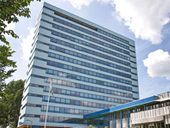 How does a “windmill” without mechanically moving parts work? This is the question currently being answered by Delft University of Technology (TU Delft) in Holland. The model-EWICON (Electrostatic WInd Energy CONvertor) was designed by Mecanoo architects and uses charged droplets of water to generate electricity.
How does a “windmill” without mechanically moving parts work? This is the question currently being answered by Delft University of Technology (TU Delft) in Holland. The model-EWICON (Electrostatic WInd Energy CONvertor) was designed by Mecanoo architects and uses charged droplets of water to generate electricity.
Tag Archives: science
Revolutionary ‘Bladeless’ Wind Generator.
Spectacular video of coronal rain released by NASA

Last week, NASA released a video recorded on July 19th 2012 which features an amazing display of what’s known as coronal rain which occurs in conjunction with a solar flare and coronal mass ejection. This process began when a massive solar flare burst from an area of magnetic activity. This was followed by a coronal mass ejection which is a violent burst of plasma and charged particles that is so powerful that it even affects the earth’s magnetosphere, causing phenomena such as the Northern and Southern lights.
Happy Birthday Copernicus
 Today’s Google doodle is dedicated to the 540th birthday of Nicolaus Copernicus – the man famous for the heliocentric model of our universe ie the model that puts the sun at the centre. Up until this model it was believed that it was the Planet Earth, in fact, which was at the centre. We now know that the Sun is the centre, not of the universe, but of our own solar system. However this revolutionary idea was a massive advance over previous theories and sowed the seeds for the scientific revolution which was to follow. One of the great polymaths of the Renaissance, Copernicus was a mathematician, astronomer, jurist with a doctorate in law, physician, quadrilingual polyglot, classics scholar, translator, artist, Catholic priest, governor, diplomat and economist. Feel free to check out the doodle at google.com (expired) and wish this Polish genius “wszystkiego najwspanialszego.” (that’s Polish for “happy birthday.”)
Today’s Google doodle is dedicated to the 540th birthday of Nicolaus Copernicus – the man famous for the heliocentric model of our universe ie the model that puts the sun at the centre. Up until this model it was believed that it was the Planet Earth, in fact, which was at the centre. We now know that the Sun is the centre, not of the universe, but of our own solar system. However this revolutionary idea was a massive advance over previous theories and sowed the seeds for the scientific revolution which was to follow. One of the great polymaths of the Renaissance, Copernicus was a mathematician, astronomer, jurist with a doctorate in law, physician, quadrilingual polyglot, classics scholar, translator, artist, Catholic priest, governor, diplomat and economist. Feel free to check out the doodle at google.com (expired) and wish this Polish genius “wszystkiego najwspanialszego.” (that’s Polish for “happy birthday.”)
Parallel Worlds, Parallel Lives.
 “How much do we know about the people we rub shoulders with every day?” is the question at the heart of this BAFTA-winning documentary first broadcast in 2007. The parallel lives in question are those of Mark ‘E’ Everett – the front-man of the band Eels – and his father, Hugh – a theoretical physicist famed for his many worlds interpretation of parallel universes.
“How much do we know about the people we rub shoulders with every day?” is the question at the heart of this BAFTA-winning documentary first broadcast in 2007. The parallel lives in question are those of Mark ‘E’ Everett – the front-man of the band Eels – and his father, Hugh – a theoretical physicist famed for his many worlds interpretation of parallel universes.
We follow Mark as he chats to former colleagues and students of his father – a genius who abandoned academia in favour of the defense industry when it became apparent that the science world wasn’t ready for his theory. Mark knew nothing of the waves his father had made even up until his death of a heart attack in 1982.
“My father never, ever said anything to me about his theories. I was in the same house with him for at least 18 years but he was a total stranger to me. He was in his own parallel universe. He was a physical presence, like the furniture, sitting there jotting down crazy notations at the dining room table night after night. I think he was deeply disappointed that he knew he was a genius but the rest of the world didn’t know it,” – Mark Oliver Everett.
The Leaving Cert results don’t lie
Data out summising the Lc results supports the drop out rate we just blogged on. Some of the most stand out figures:
-only 16% do higher level maths (many Science / Tech courses require this for entry)
-4,600 do higher level physics / 6,ooo take higher level Chemistry (out of 57,000 students)
-7,000 apply to do Science courses (vs. 17,000 doing Arts). This actuyally represents a 21% increase in Science applications ove rlast year, but when average points down for courses across the board, the standard of student seems to be waning (70 less A1’s than 2008). It will be interesting to see the trend in drop out figures over the next number of years….
Brian – brian dot c at lifescience dot ie

